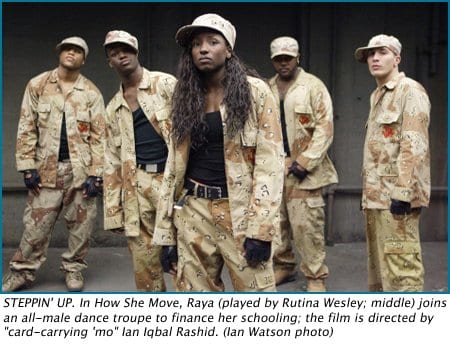***
Happily queer director Ian Iqbal Rashid, whose first feature Touch of Pink made a splash in the gay world, is successfully showing off his chops with his latest indie flick How She Move. Set in Toronto’s Jane and Finch area, this gritty, fast-paced and entertaining coming-of-age tale steps itself to success in a Hollywood-styled urban dance film with a unique Caribbean-Canadian twist. Sparking a bidding war when it screened at Sundance last year How She Move, written by Annmarie Morais and produced by another queer in the business, Jennifer Kawaja of Sienna Films, is a feature that rises above the genre of a typical dance film.
How She Move is the story of Raya, a Jamaican-Canadian girl who is fighting to reconcile where she came from and where she wants to go. She finds her groove through stepping or step dancing, a style of dancing rooted in Africa and the African diaspora.
“I grew up in Flemingdon Park, a neighbourhood which is in many ways similar to Jane and Finch,” says Rashid. “When I was a kid ‘Flemo’ had a significant Jamaican-Canadian identity.” In the film Raya (played by Rutina Wesley) is looking for a way to finance her return to a private school. Looking at the prize money from underground dance competitions, she asks Bishop (Dwain Murphy), a hot young step dancer, to let her join his all-male team.
“I identified with the story’s central character Raya, who is torn between wanting to be true to herself and living out her immigrant family’s ambitions,” Rashid says. “It’s about aspiration and education but it rejects the idea of having to ‘leave to achieve.’
“How She Move is about the scars of migration — which has been a recurring theme in all of my work, from my early poetry and TV writing, through my short films and Touch of Pink.”
Movement and dance are integral to the story; choreographer HiHat has worked with Missy Elliott and Mary J Blige. The most exhilarating scenes happen at a Detroit stepping competition where Raya and her friends vie for top prize. “As a card-carrying ‘mo I’ve always loved musicals,” Rashid says. “Films like Saturday Night Fever and Fame, which I loved when I was a kid, were a big influence.”
Some controversy followed Touch of Pink in Rashid’s Ismaili Muslim community. “Some Ismailis felt I was disrespectful in airing the community’s dirty laundry in public and tried to organize a boycott,” Rashid says. “It failed due to the fact the film had many champions and has gone on to being used by many Muslim organizations as a tool for discussion and social change.”
That controversy had nothing to do with the choice to direct the more mainstream How She Move. “I hope to do many different kinds of films throughout my career, both gay and straight, although those categories are getting more complicated by the day,” he says. “On that level I would argue that How She Move has a queer sensibility. I think it might feel like a very different film if it was directed by a straight man.”
Bishop’s younger brother Quake (Brennan Gademans) plays a small but pivotal role as both a dancer and choreographer; he establishes that it is good to be different. “Quake was not written as gay. But I immediately identified with the gawky, bookish, artsy kid who dressed flamboyantly and was bullied by the other boys,” says Rashid. “I think a lot of gay kids — any kind of outsiders, really — will identify with Quake.”

 Why you can trust Xtra
Why you can trust Xtra


